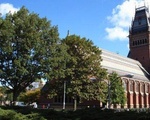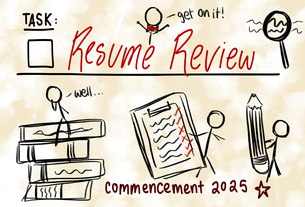SEAS
Renaissance Engineering
In the four years since SEAS became its own school within the University, Harvard has come a long way towards addressing that “incomplete” on its report card.
Coolness.Factor++
Students and professors alike say that the image of the computer scientist has changed along with the growing popularity of the field.
Report Identifies Most Lucrative College Majors
For students who may be less sure of their academic paths, a study published Tuesday raises questions about the financial implications of choosing one concentration over another.
Joanna Aizenberg Named Director of Kavli Institute
Materials science professor Joanna Aizenberg has been appointed the new director of the interdisciplinary Kavli Institute for Bionanoscience and Technology, the School of Engineering and Applied Sciences announced last Tuesday.
Challenges Remain for SEAS, Murray Says
Faculty, staff and students in the School of Engineering and Applied Sciences joined SEAS Dean Cherry A. Murray for this semester’s All Hands meeting to highlight the renewed emphasis on teaching labs at SEAS as well as goals for future investment across the School.
Gates Grant Funds Soil-Based Power
The School of Engineering and Applied Sciences has won $100,000 to harness the electrical power generated by microbes in the soil beneath our feet.
Grosz To Step Down as Dean
Dean of the Radcliffe Institute for Advanced Study Barbara J. Grosz announced yesterday that she will step down from her post of four years to return to the School of Engineering and Applied Sciences faculty.
SEAS Plans New Electrical Engineering Concentration
The School of Engineering and Applied Sciences plans to petition for a new concentration in Electrical Engineering—projected to be offered in fall 2012—in response to student desire for a more focused curriculum in the engineering sciences. The concentration would have 20 required half-courses and give students a Bachelor of Sciences degree.
Ranking Says Harvard Students More Stressed
Harvard has a habit of being near the top of many rankings. Harvard earned another distinction yesterday, but this one was not quite as enviable.
Ground Breaking New Fuel Cells Developed
Materials scientists at the Harvard School of Engineering and Applied Sciences have developed the first macro-scale thin-film solid-oxide fuel cell, potentially serving as a new source of clean energy.
SEAS Observes Nesting Hawks
A pair of hawks has made their nest atop the Maxwell-Dworkin Laboratory building, and a School of Engineering and Applied Sciences team has installed a surveillance system to observe the building’s newest residents.
CS Will Offer New Class on Discrete Math
The Computer Science Department plans to debut a new course—Computer Science 20: “Discrete Mathematics in Computer Science”— next spring that will better prepare students for the required proof-intensive course CS 121.
Researcher Presents on Flying Robots
Dario Floreano, a professor at the École Polytechnique Fédérale de Lausanne (EPFL) in Switzerland, presented his recent research on autonomous flying robots to a packed room at the School of Engineering and Applied Sciences yesterday.
Professors Reconsider Applied Math 50
Applied Mathematics 50, a survey course with more than 100 students, may undergo restructuring next fall as faculty members reconsider its future within the concentration curriculum.
Harvard Professors Weigh in on Nuclear Threat
Though dangerous levels of radioactivity still pose a threat to the population around the deteriorating nuclear reactors at the Fukushima Power Plant in Japan, Harvard professors say that while the disaster may cause dangerous pollution, its consequences will not reach the most dire predictions.








